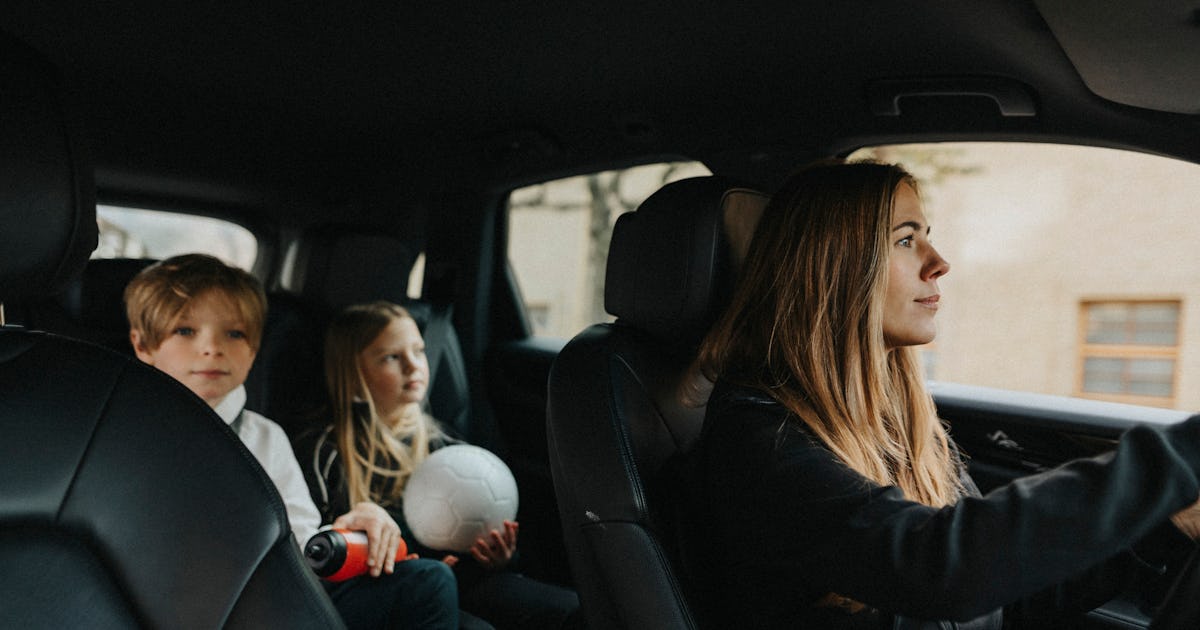
There are many (many) things no one warned me about before I became a parent. Which is honestly wild, because as soon as you announce you’re expecting, it seems like everyone lines up to tell you all of the trials and tribulations you’ll soon face. And yet, I don’t remember a single soul warning me that parenting turns you into a constantly on-call chauffeur.
As a ’90s kid, I watched far too many movies in which everyone took the bus to and from school, or lived in an idyllic town that allowed them to walk or ride bikes wherever they needed to go. Perhaps that skewed my perspective, because I could not have imagined that I would be here, spending literal hours every day shuttling my children around.
From band to theater to sports, today’s kids are more scheduled-out than ever, and it’s often moms behind the wheel to and from these extracurriculars. That got me thinking: Has “helicopter parenting” evolved to become “Uber parenting”? Instead of hovering, are we all constantly shuttling?
Why Parents Are Driving More Than Ever
I don’t remember being in the car that much growing up, but we lived in a small town where you could walk to and from many activities. Plus, anywhere we did have to go involved a much shorter commute than mine does now, as the mom of kids who live in a busy city.
According to Amy Morin, psychotherapist, bestselling author, and host of the Mentally Stronger podcast, it has a lot to do with a cultural shift in attitude toward kids’ activities.
“In past generations, kids were expected to make their own way to their social activities — ride a bike, stay after school, or get a friend’s parent to drive. Kids engaged in fewer activities, and parents didn’t plan their day around their kids’ activities,” she says. “Many parents today have shifted to become more like concierges, where they’re planning their kids’ schedules and arranging to transport them everywhere on time.”
And although some families do live close enough to school or their activities to walk, parents often still opt to give their kids rides. “With all of the safety concerns, many parents don’t feel comfortable allowing their children to walk,” explains mental health expert Emily Mendez. “Therefore, they drive them.”
Clinical psychologist Dr. Anne Welsh says that a few other elements are at play, too. Like the fact that we’re parenting in the post-COVID era. During the pandemic, many activities stopped and we weren’t doing nearly as much shuttling around. A major factor, though, is how the fabric of society has changed. The economy does not look for us like it did for our parents when they were raising us, and that’s reflected in our Uber parenting.
“As school budgets get tighter, fewer activities are being offered by the schools, and there is more need for transport to them,” she says, pointing out that this is compounded by another huge factor: “More and more families are dual-working parent families.” Between that and the recent return-to-office pushes, many households end up having to rely on the parent with the more flexible schedule.
The Toll of Being the Family Chauffeur
Because I spend so much time carting my kids around, I’ve noticed that I have to be much more intentional about making plans for myself. The experts agree that a natural side effect of being the family chauffeur is losing a good chunk of your “you time.”
“Many parents struggle to have their own leisure activities because their time is spent driving the children to activities,” says Morin. “It also affects parents’ ability to get things done. When they’re waiting outside of basketball practice for an hour, they’re not able to be at home managing household activities. This means less time for self-care and less time for leisure.”
In turn, it can start to feel like you’re not just losing time; you’re losing yourself.
Says parenting expert Richard Ramos, “The physical exhaustion is one thing, but the emotional toll is another. Many parents, moms in particular, feel like they’re losing themselves in the process of being the family chauffeur. It’s easy to feel like your identity is reduced to being a service provider rather than a parent or partner. This constant hustle can lead to resentment, burnout, and a sense of disconnection from your own needs and goals.”
The Tricky Art of Car Convos
Obviously, it would be impossible for family dynamics NOT to be affected by everyone piling into the car and driving around all the time. If you’re in the thick of it like me, you know that it can get tense.
Says Morin, “Stress levels are often high as parents run from one activity to the next. There’s less time for natural family time around the house, which is where the real magic happens when it comes to building relationships. Quality time together is reduced, and there’s pressure to hurry, pack for an activity, and get ready for the next thing.”
Alternatively, it can be a great opportunity to squeeze in some uninterrupted 1:1 time. “In the care, we can sometimes talk about the harder things and get a little more attention than we might otherwise,” explains Welsh. “I can learn about my kids’ music preferences if I let them control the stereo, or talk about what happened at school. And even the waiting area can be a place where I get to play cards with my younger kids.”
For parenting expert, educator, and mom of two Danielle Lindner, the days of constant car rides with her kids are among her favorite (albeit most hectic) parenting moments.
“It was exhausting, yes, but those were the times I had my kids all to myself. Those car rides, however short or long, gave me the opportunity to have a captive audience, to ask about their days, their lives, their dreams, or just have a few minutes of their attention to get next week’s schedule organized without the distraction of friends, TV, phones, etc.”
She encourages parents to try to view this time through a positive lens. After all, she points out, “I guarantee the first day they ask for the car keys, most moms will think, ‘How about I just drive you?’”
Fighting Uber Parent Fatigue
Repeat after me: It’s OK to set boundaries so that you aren’t spending your entire week stuck in the cycle of driving and waiting and driving and waiting. “Most kids are overscheduled. It’s healthy to set limits on how many activities or how often you’re driving,” reassures Morin. “Kids need downtime, too.”
As for ways to make the time you do have to be a road warrior more manageable, the experts had some helpful hacks and tips to share:
- “I’ve seen families who help kids choose classes with their friends for planned carpooling, or choose activities within a limited distance so the time spent driving is not as long.” — Welsh
- “In really busy extracurricular seasons, we have about seven or eight quick dinner options we just rotate through.” — Welsh
- “I’ve learned to keep both work and a deck of cards with me at all times to make use of small bits of time … I wrote much of my forthcoming book, Ambitious Mother, in the gymnastics waiting room while my youngest had her weekly class!” — Welsh
- “Listening to a podcast or audiobook on the drive can help you meet some of your needs.” — Morin
- “You can also look for opportunities to be a good role model. When you’re stuck in traffic, you can demonstrate how to handle frustration. Or when you encounter an aggressive driver, you can show your child how to respond in a healthy way.” — Morin
- “Use the car time as an opportunity to connect. Ask open-ended questions, share stories, or even listen to an audiobook together.” — Ramos
A few things I’ve found really help: getting a Regal Unlimited pass so I can watch movies on the really long wait days, using the time to do a little thrift shopping, convincing friends to meet me for dinner or drinks, and bringing workout clothes so I can walk the bridge or a local trail.
This, Too, Shall Pass
The reality is this is our reality. We sign our kids up for — or let them sign up for — activities and extracurriculars because we want them to have joy. We want their lives to be enriched. And while I’m dog-tired right now and practically live in my car from the hours of 6 p.m. to 10 p.m. most nights, I know that this phase will be over before I know it.
“Your ultimate goal as a parent isn’t to be their chauffeur,” reminds Ramos. “It’s to prepare them for life. Sometimes, that means letting them navigate their own schedules and responsibilities as they grow older.”
So, that’s what I’m trying to hold onto during the endless shuffle of pick-ups and drop-offs: That, for as exhausting as Uber parenting can be, it’s also one of the last times I’ll get to ride shotgun in my kids’ everyday lives.
Disclaimer: This content was automatically imported from a third-party source via RSS feed. The original source is: https://www.scarymommy.com/parenting/no-one-prepares-you-to-become-family-chauffeur-uber-parenting. xn--babytilbehr-pgb.com does not claim ownership of this content. All rights remain with the original publisher.






